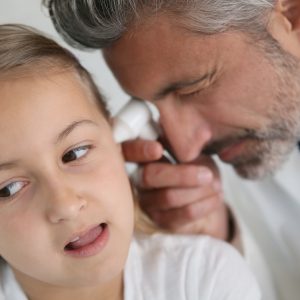
Seasonal Allergies in Spring – Ease Allergy Symptoms in Kids
Have runny noses, sneezes, and itchy, watery eyes taken over your children? As we head into spring, the plants are blooming, blossoming, and bringing a lot of pollen our way. As a pediatrician in the ER, I get asked about allergy symptoms in kids and how to prevent and treat these reactions on a daily basis.
I’ve put together my top five most asked questions about seasonal allergy symptoms in kids, how to prevent and treat springtime allergies, and when you may be dealing with more than just allergies (think allergy and asthma care).
#1 Can you explain seasonal allergies and why my child’s allergies are so bad in the springtime?
The reason for the spike in allergy flare-ups in spring is due to the blooming trees, plants, and flowers. Pollen and other products of nature get carried by the wind and end up in our noses, eyes, and lungs.
Our immune system reacts to the foreign elements and releases histamine, which causes swelling and mucus production in the nose, redness and tearing in the eyes, and itching. More seriously, it can cause wheezing, excess mucus production, and swelling in the lungs.
#2 How do I know whether my child’s runny nose is allergies vs. a cold?
Colds and seasonal allergies share a lot of the same symptoms, but there are a few differentiating features that can help you tell the difference.
-
Fever
If your child has a fever, chances are they may be suffering from an upper respiratory infection (the common cold). Many times, a common cold will be associated with a low-grade fever, whereas seasonal allergies never cause a fever.
-
Duration of Symptoms
The symptoms from a common cold typically last 10 to 14 days. If your child is having persistent congestion or a nighttime cough for more than two weeks, it is important to have them evaluated by their pediatrician. Ongoing symptoms may indicate seasonal allergies.
-
Itchiness
The common cold and allergies can both cause symptoms involving the throat and eyes. However, allergies typically cause itchiness, whereas colds can cause watery eyes and sore throats.
-
Speed of Onset
Exposure to allergens can trigger symptoms quickly. With seasonal allergies, your child may be outside playing and suddenly develop a runny nose and watery eyes. The symptoms of a cold tend to occur more gradually. One day your child is complaining of sore throat and fatigue, and over the next few days, they start to develop a runny nose and cough.
-
Time of Year
Although not always reliable, the time of year can be helpful in differentiating between a cold and seasonal allergies. You can get a cold year-round, but most people consider the fall and winter months to be cold season. Spring is the season for allergies.
Again, the reason for the spike in allergy flare-ups in spring is everything in bloom, causing an excess of pollen in the air.
If your child has a continually runny nose, cough, and watery eyes at the beginning of spring season lasting for 3-4 weeks, it is highly likely your child is experiencing a reaction to seasonal allergies.
#3 What can I do at home to combat allergy symptoms in kids?
Spring brings beautiful days and weather and we would all love to open up our windows. But if your child is suffering with seasonal allergies, the best thing to do is keep your windows closed to reduce your child’s exposure to pollen.
Additional steps you can take to reduce exposure to allergy triggers include:
- Make sure your child changes their clothes when they come home from school.
- Bathe your child when they come inside after school or sporting events.
- Do not keep backpacks and sporting bags in bedrooms.
- If your child has long hair, pulling their hair back can decrease the number of triggers to their nose and eyes.
- Wipe down your dog’s paws after going for a walk or outside as they can bring pollen into the house.
- A good air filtration system can help pull some of the pollen out of the indoor air.
- Avoid outdoor activities when the pollen count is at its highest.
#4 How can I treat my child’s allergies?
The key to controlling your child’s allergies is identifying your child’s specific triggers, like pollen. Often, this step includes visiting an allergist who will perform various tests to identify your child’s potential triggers.
There are also over-the-counter (OTC) products and dietary supplements that may help treat allergy symptoms. Parents should read the label and choose products that are for your child’s age.
#5 How do I know if my child has seasonal allergies or asthma?
This difference can be difficult to spot as a child’s allergies can sometimes trigger asthma and lead to similar symptoms. If your child has asthma, there is a good chance you’ll receive a referral to an allergist to identify possible triggers for your child’s asthma.
One indication that your child might be having an allergic reaction instead of an asthma attack is if other organ systems, such as skin or the GI tract, are involved. Symptoms such as rash, itchy eyes, GI upset, or vomiting can be indicators that your child is having an allergic reaction, not asthma.
An asthma diagnosis is not certain until closer to age 6-7 years old because of lung function. But children can often develop symptoms much earlier in life.
If your child suffers from asthma, your pediatrician may suggest trying pseudoephedrine, epinephrine, or racepinephrine to relieve symptoms.
Note: Children under the age of 12 should not use OTC asthma medicines containing ephedrine.
Final Thoughts on Seasonal Allergy Symptoms in Kids
For parents with children suffering from seasonal allergies, knowing your child’s triggers and best treatment options can make all the difference this time of year. My best advice is to plan ahead, especially if your child has asthma or tends to wheeze.
With the right care and treatment plan, you can help your child manage their allergies (or asthma), so they can live a happy, healthy life!
~Dr. Katie




